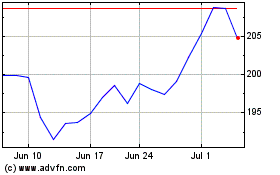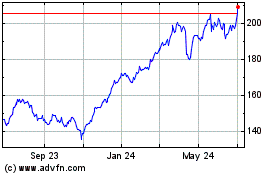Indonesia to Rein In Dealers -- WSJ
January 09 2017 - 3:02AM
Dow Jones News
By I Made Sentana and Ben Otto in Jakarta, Indonesia and Rachel Rosenthal in Hong Kong
JAKARTA, Indonesia -- Indonesia is planning stricter rules for
market reports written by banks acting as primary dealers for
government bonds, days after severing ties with J.P. Morgan Chase
& Co. over what officials here said was a faulty equities
downgrade.
Talk of such a move is highlighting the potential conflicts
banks face in Southeast Asia's largest economy as they try to
provide unbiased research to investors and banking services to
clients they evaluate.
Finance Ministry officials told The Wall Street Journal on
Saturday that they could begin discussing new policies on Monday
for the 19 financial institutions that act as primary dealers in
Indonesia's regular government domestic bond auctions. The ministry
appoints banks and securities firms as primary dealers to buy
government bonds in auctions and then resell them in the secondary
market.
"Our goal is to ensure that banks don't release unnecessary
reports that could destabilize the market, and that they
differentiate between reports for internal circulation and those
for public consumption," said Schneider Siahaan, director of debt
portfolio and strategy for the ministry.
"Basically, it is about how to minimize the negative tone, how
to minimize negative repercussions," he added.
Robert Pakpahan, director general of budget financing and risk
management, said the ministry wasn't considering banning market
research reports. He added that it was too early to speculate on
the final nature of a change in policy, given that no formal
meetings on the matter have taken place.
The discussions stem from a Nov. 13 report about the global
repercussions of Donald Trump's election victory in the U.S., in
which J.P. Morgan downgraded its rating on Indonesian equities to
underweight from overweight, saying that a rise in bond-market
volatility "increases emerging-market risk premiums." The largest
U.S. bank by assets also made smaller downgrades to Brazilian and
Turkish equities.
Indonesian finance officials said in recent days that the
research lacked credibility and could destabilize the country's
financial system. The government has cut its business partnerships
with J.P. Morgan, including removing the bank from a list of
primary dealers for government bond auctions.
An economist at a local primary dealer said J.P. Morgan had been
the only primary dealer to issue such a downgrade during a volatile
time for emerging markets after Mr. Trump's election.
In the banking world, securities analysts are supposed to
provide independent, unvarnished investment advice to their
commission-paying clients, but a negative word can alienate clients
on the other side -- the stock and bond issuers that pay banks
large fees to help them raise capital. That can cost bankers access
to corporate executives or government officials, and lose them
business from the offended issuers.
"It will make banks cautious" in Indonesia, said Kay
Van-Petersen, global macro strategist at Saxo Bank in Singapore.
"The research side is hard to justify. The big business is from the
underwriting and getting the fees."
He said any move wouldn't necessarily affect investor interest
in Indonesia, where a $900 billion economy for years has posted
growth of around 5% or better. Emerging-market investors "are used
to that kind of stuff," he said.
Major foreign primary dealers in Indonesia, including Citibank,
Deutsche Bank, HSBC and Standard Chartered, declined to
comment.
J.P. Morgan has said that it is working toward a resolution with
the Finance Ministry. The bank said its business in Indonesia
continues to operate as usual and that the effect on clients is
minimal.
Still, being a primary dealer is an important part of business
in a country like Indonesia where foreigners own a significant
portion of domestic bonds -- almost 40%. That business can be worth
tens of millions of dollars to banks annually and opens pathways to
even more lucrative business with investors in secondary market
trading.
J.P. Morgan is one of the largest foreign banks in Indonesia,
and dealt with some of the largest flows from foreign investors
into and out of government bonds. For that reason, officials here
view the bank's research as especially pivotal to budgetary
fundraising, financial analysts say.
A senior official of an Indonesian government financial
institution said the government recognized that negative research
reports are a fact of life, and that the Finance Ministry's policy
response is likely to be measured. "Analysts can't recommend 'buy'
or 'overweight' all the time," the official said.
Write to I Made Sentana at i-made.sentana@wsj.com, Ben Otto at
ben.otto@wsj.com and Rachel Rosenthal at
Rachel.Rosenthal@wsj.com
(END) Dow Jones Newswires
January 09, 2017 02:47 ET (07:47 GMT)
Copyright (c) 2017 Dow Jones & Company, Inc.
JP Morgan Chase (NYSE:JPM)
Historical Stock Chart
From Mar 2024 to Apr 2024

JP Morgan Chase (NYSE:JPM)
Historical Stock Chart
From Apr 2023 to Apr 2024
